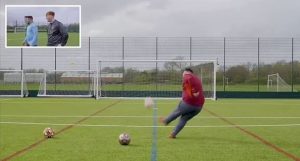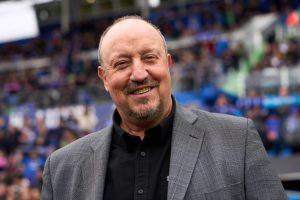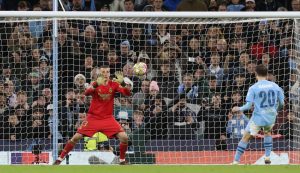Before MND I was rugby ace – being carried over marathon line by my mate was like scoring in cup final, says Rob Burrow

IT’S a tender image that touched the nation’s hearts – rugby ace Kevin Sinfield carries his pal and former team-mate Rob Burrow over the line at the Leeds Marathon in a testament to an extraordinary friendship.
And today motor neurone disease sufferer Rob reveals his devoted pal’s light-hearted words as they completed the arduous 26.2-mile race together.
PARugby ace Kevin Sinfield carries his pal and former team-mate Rob Burrow over the line at the Leeds Marathon in a testament to an extraordinary friendship[/caption]
Richard WalkerWhen we meet at Rob’s home in Yorkshire, he beams with delight as wife Lindsey talks us through that poignant marathon moment[/caption]
Rob, 40, says: “Kevin whispered, ‘You’re not going to beat me, Rob, we are finishing together’. He then kissed me on the cheek.”
The dad-of-three — who talks through a computer like the late physicist Stephen Hawking, who also had MND — adds: “It was a day in a million. It felt like scoring in a Grand Final again.”
Former Leeds Rhinos, England and Great Britain rugby league star Rob was given a year to live after his diagnosis in December 2019.
He has not only beaten the grim prognosis but made it his mission to raise awareness of the cruel disease — which leaves sufferers trapped in their own bodies — and has helped to launch a £6.8million campaign for a state-of-the-art MND centre.
Last weekend’s inaugural Rob Burrows Leeds Marathon gave the fund an £825,000 boost.
Rob was pushed around the route in his adapted chair before Kevin, 42, lifted him out to carry him over the line in emotional scenes.
Rob says: “It felt fantastic to be part of a team again with my mate Kevin as our captain.
“Kevin joked that he didn’t want me to beat him by crossing the line (in my chair) first. I think he knew I had a cunning plan to claim that I finished before him.
‘No-tears policy’
“I want him to know that I have a plan to beat him next year.”
When we meet at Rob’s home in Yorkshire, he beams with delight as wife Lindsey talks us through that poignant marathon moment.
He says: “It’s such an iconic picture. We’ve had messages from people all around the world telling us how moved they were by what Kev did.”
Rob is confined to his wheelchair, unable to move or talk, and relies on Lindsey and his parents Geoff and Irene to dress and feed him.
He had hoped to “talk” to me through a special machine which uses Rob’s eye movement to pick out words recorded before he fell ill.
On the day I visit, his frustration is obvious as the machine only works intermittently. But his dazzling smile remains, and you can see the sparkling character through his eyes as the family talk about Rob the “joker” who, at 5ft 4in, was one of Britain’s smallest-ever pro rugby players.
Lindsey, who also ran the marathon for the charity, says Rob displays the same resilience off the field as he did on it.
Little and large – 5ft 4in Rob with pal and team-mate Kevin in 2011Rex
Rob with his family for support at the Leeds MarathonRichard Walker
She reveals he has a “no-tears policy” when it comes to his illness after being inspired by Scotland rugby union legend Doddie Weir, who lived with MND for five years before his death last year aged 52.
Lindsey, 40, also tells how the couple faced the heartbreaking prospect of telling their children Macy, 11, Maya, eight, and four-year-old Jackson about Rob’s illness.
She says: “We told them that the doctors and nurses were doing everything they could for Daddy but that he had MND and it was life-limiting.”
The couple, childhood sweethearts who started dating aged 14, also faced an agonising wait to find out if Rob’s disease was caused by a faulty gene, which could pass the condition to their kids. Fortunately, he was free of the gene, carried by fewer than five per cent of MND patients.
Despite studies which have shown rugby players could potentially be at greater risk of neurological diseases, Rob and Lindsey have put his illness down to “sheer bad luck”.
The couple, who married in 2006, had appeared to have the perfect life before Rob’s diagnosis.
They had just moved into a beautiful new home in Pontefract after Rob retired from the field, taking up a role as head coach at Leeds Rhinos Academy.
Friends began to notice that Rob’s speech had become slurred, which the family first put down to strong painkillers he was taking for an old rugby injury. But he then started having difficulty pronouncing words.
When pal Kevin noticed Rob struggling to say “consistency” at a rugby presentation, the Rhinos sent him to see the club doctor. Three weeks later the family were given the devastating diagnosis.
Lindsey says: “At the time Rob was physically well, still coaching rugby, picking the kids up from school, driving, living quite a normal life. It was mainly his speech.
“And he was strong. Pound for pound, he was the strongest player in the team.”
As Rob began “voice banking” — recording his words so he could later use the machine to “talk” — Kev took him to see Doddie Weir.
Lindsey says: “Rob handled the diagnosis quite well. The first thing he said after his appointment was, ‘I’m glad it’s me and not you or the children’.
“Within the first couple of weeks, Kev took Rob to meet Doddie, and that was a real turning point.
“Doddie instil-led hope into Rob, telling him, ‘Despite what they tell you, fight this and carry on with life’.
“Rob came home and told me, ‘Right, there’s a no-tears policy, we deal with this. It is what it is and we keep things as normal as possible for the children and make happy memories’.
“Rob said he would accept the diagnosis but fight the prognosis.”
The couple made the decision to tell their children within days of getting the news. Lindsey says: “It was a really hard thing to do.
“At the time Jackson was just one. Maya was about four and said, ‘What are you telling us that for? It’s really boring’, and went back to playing.
“Macy didn’t say much at the time but went to a party later that day and came back and asked, ‘Does that mean Daddy is going to die?’ We told her it would shorten his life but everyone was doing what they could to help Rob.”
Lindsey, an NHS physiotherapist, says their situation is made all the more harrowing by the fact that Rob was such a hands-on dad.
She adds: “He’d take them to the mums’ groups when they were small, the playgroups, the park. He absolutely idolises his children.
“And that’s the hard part, that it’s been taken away from him. Imagine not being able to read your children a bedtime story or take them swimming or to the park.”
Lindsey says it was three months after diagnosis, as Britain went into the first lockdown, that Rob’s physical health started to deteriorate as well as his speech.
She recalls: “He became quite unsteady on his feet. He had a number of falls and began using a mobility walker around the house by the summer. The disease took hold so quickly.”
By October 2020, Rob had lost his voice. Today he has virtually no movement.
One of the cruelties of MND is that, while patients eventually lose all mobility, their brains remain as active and sharp as ever.
Lindsey says: “What’s incredible about Rob is that he never complains.
“I don’t know how he does it. He was always a joker, a bit of a prankster, who liked to have banter with the boys at rugby.
“They all come to see him all the time, which he loves, but sometimes by the time he’s typed responses into his machine the conversation has moved on.
“But he never moans, genuinely, hand on heart. I can only put it down to the mental toughness he developed in rugby.
“He’s always been such a happy person, even when he got up at 6am to train, when most people would be grumpy, and that’s not changed. He’s always smiling.”
Rob is on two drug trials, which his family say have prolonged his life.
But Lindsey knows one day she may face a future without her first and only love — something the couple don’t talk about.
She says: “I try not to think about the future because I can’t imagine one without Rob in it. I may be in a bit of denial but I think you just have to take each day as it comes.
“Rob doesn’t like to talk about it either and I have to respect his wishes because he’s the one living with this disease, the one going through it.
“As a family we don’t want self pity, we don’t ask, ‘Why us?’. It is what it is.
“Rob doesn’t carry a faulty gene that can play a part in MND, which was a relief, so it’s just bad luck.
“Neither of us thought we’d be on this path. When Rob retired we had those visions of being together until we grew old and to be hit with the diagnosis was devastating, but we can’t dwell on that.
“I think the positivity comes from Rob. He’s the tower of strength for the whole family. Motor neurone disease has taken a lot from us but we have to deal with the cards we’ve been dealt.
“I’m just grateful for every day Rob is here. He’s still the same person I married all those years ago, just in a body that doesn’t function.”
Lindsey says Rob is a naturally shy, private person, but has pushed himself forward to raise awareness of the condition — and money for the new centre in Leeds.
His mate Kev has raised £8million for MND charities since his friend was diagnosed.
Now the whole world knows just how strong that bond truly is.
To donate to Lindsey’s marathon efforts see justgiving.com/fundraising/lindsey-burrow1.
GettyScotland rugby union legend Doddie Weir, who lived with MND for five years before his death last year aged 52[/caption]
Rob and best pal Kevin delighting the crowds during the Leeds MarathonPA






